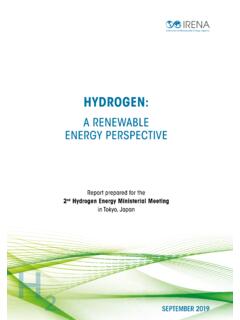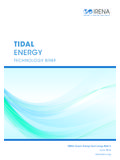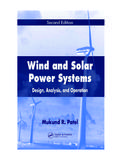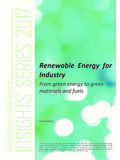Transcription of Renewable Energy in the Water, Energy and Food …
1 JANUARY 2015 Renewable Energy IN THE WATER, Energy & FOOD NEXUS Copyright IRENA 2015 Unless otherwise indicated, material in this publication may be used freely, shared or reprinted, so long as IRENA is acknowledged as the source. This publication should be cited as: IRENA (2015), Renewable Energy in the Water, Energy & Food Nexus .About IRENAThe International Renewable Energy Agency (IRENA) is an intergovernmental organisation that supports countries in their transition to a sustainable Energy future, and serves as the principal platform for international co-operation, a centre of excellence, and a repository of policy, technology, resource and financial knowledge on Renewable Energy .
2 IRENA promotes the widespread adoption and sustainable use of all forms of Renewable Energy , including bioenergy, geothermal, hydropower, ocean, solar and wind Energy , in the pursuit of sustainable development, Energy access, Energy security and low-carbon economic growth and prosperity. AcknowledgementsThis report benefited from valuable comments by the following reviewers: Vaibhav Chaturvedi (Council on Energy , Environment and Water, India); Michele Ferenz (EastWest Institute); Olivier Dubois, Alessandro Flammini, Jippe Hoogeveen and Lucie Pluschke (FAO); Katja Albrecht, Detlef Klein, Jan-Christoph Kuntze, Gerhard Rappold, Ulrike von Schlippenbach (GIZ on behalf of the German Federal Ministry for Economic Cooperation and Development), Karl Moosmann (GIZ), Maria Weitz (GIZ).
3 Jordan Macknick (National Renewable Energy Laboratory); Martin Hiller and Andreas Zahner (REEEP); Jeremy Foster (USAID); Anna Delgado, Diego J. Rodriguez and Antonia Sohns (World Bank); Manisha Gulati (WWF South Africa); Ghislaine Kieffer, Diala Hawila, Salvatore Vinci, Elizabeth Press, Deger Saygin, Linus Mofor, Nicholas Wagner, Henning Wuester, Olivier Lavagne d Ortigue and Arturo Gianvenuti (IRENA). IRENA would like to acknowledge the contribution of Qatar Foundation to this : Rabia Ferroukhi, Divyam Nagpal, Alvaro Lopez-Pe a and Troy Hodges (IRENA); Rabi H.
4 Mohtar, Bassel Daher, and Samia Mohtar (Texas A&M University); Martin Keulertz (Purdue University).For further information or to provide feedback, please contact IRENA s policy unit, Box 236, Abu Dhabi, United Arab Emirates; Email: report is available for download from this publication promotes the adoption and use of Renewable Energy , the International Renewable Energy Agency does not endorse any particular project, product or service provider. The designations employed and the presentation of materials herein do not imply the expression of any opinion whatsoever on the part of the International Renewable Energy Agency concerning the legal status of any region, country, territory, city or area or of its authorities, or concerning the delimitation of its frontiers or Energy INTHE WATER, Energy & FOOD NEXUSRENEWABLE Energy IN THE WATER, Energy & FOOD NEXUS FOREWORD3 FOREWORDBy 2050, global demand for Energy will nearly double.
5 While water and food demand is set to increase by over 50%. Meeting this surge of demand presents a tremendous challenge, given competing needs for limited resources amid heightened climate change effects. To overcome the increasing constraints the world faces, we need to fundamentally rethink how we produce and consume Energy in relation to the water and food Energy technologies provide access to a cost-effective, secure and environmentally sustainable supply of Energy . Their rapid growth can have substantial spill-over effects in the water and food sectors.
6 Yet detailed knowledge on the role renewables can play in the nexus remains limited and widely dispersed. Renewable Energy in the Water, Energy and Food Nexus aims to bridge this gap, providing the broad analysis that has been lacking on the interactions of renewables within those key sectors. Building on existing literature, the study examines both global and country-specific cases to highlight how Renewable Energy can address the trade-offs, helping to address the world s pressing water, Energy and food the Gulf Cooperation Council countries, for example, realising Renewable Energy plans could reduce water withdrawals for power generation 20% by 2030, the report finds.
7 Water withdrawals in the sector could decline by nearly half for the United Kingdom, more than a quarter for the United States, Germany and Australia, and over 10% for India by 2030 on the back of substantial deployment of renewables, particularly solar photovoltaic and wind power. In addition, Renewable -based technologies can make water accessible for domestic and agricultural purposes, improving supply security while decoupling growth in water and food from fossil different stages of the food supply chain, integrating renewables can improve productivity and reduce losses.
8 The agrifood sector, meanwhile, can further bioenergy development, which, when managed sustainably and efficiently, can transform rural economies, enhance Energy security, and contribute to environmental objectives. I am confident this study will expand the available knowledge base and contribute to an increasingly vigorous global discourse on the challenges and opportunities of Renewable Energy in the Z. Amin Director-GeneralInternational Renewable Energy AgencyIRENA4 TABLE OF CONTENTS Executive Summary ..12 Introduction.
9 211 The Water Energy Food Nexus ..231 .1 Introducing the water, Energy and food nexus ..231 .2 The water Energy nexus .. Quantifying the water Energy nexus .. Water-related risks to Energy security .. Energy -related risks to water security ..321 .3 The water food nexus .. Quantifying the water food nexus .. Water-related risks to food security .. Food-related risks to water security ..411 .4 The Energy food nexus .. Quantifying the Energy food nexus.
10 Energy -related risks to food security .. Food sector-related risks to Energy security ..461 .5 Identifying integrated solutions to manage the water Energy food nexus ..472 Renewable Energy in the Nexus ..512 .1 Introduction ..512 .2 Renewable Energy in the water Energy nexus .. Renewable Energy for water supply .. Water for Energy production ..652 .3 Renewable Energy in the food Energy nexus .. The role of Renewable Energy in the food supply chain.











![[Logo To Come] - Lazard](/cache/preview/b/e/f/6/9/1/8/9/thumb-bef691898073c3588972f362b9ac0cd8.jpg)


